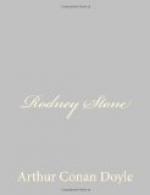I have said already that Boy Jim had no love for his books, but by that I meant school-books, for when it came to the reading of romances or of anything which had a touch of gallantry or adventure, there was no tearing him away from it until it was finished. When such a book came into his hands, Friar’s Oak and the smithy became a dream to him, and his life was spent out upon the ocean or wandering over the broad continents with his heroes. And he would draw me into his enthusiasms also, so that I was glad to play Friday to his Crusoe when he proclaimed that the Clump at Clayton was a desert island, and that we were cast upon it for a week. But when I found that we were actually to sleep out there without covering every night, and that he proposed that our food should be the sheep of the Downs (wild goats he called them) cooked upon a fire, which was to be made by the rubbing together of two sticks, my heart failed me, and on the very first night I crept away to my mother. But Jim stayed out there for the whole weary week—a wet week it was, too!— and came back at the end of it looking a deal wilder and dirtier than his hero does in the picture-books. It is well that he had only promised to stay a week, for, if it had been a month, he would have died of cold and hunger before his pride would have let him come home.
His pride!—that was the deepest thing in all Jim’s nature. It is a mixed quality to my mind, half a virtue and half a vice: a virtue in holding a man out of the dirt; a vice in making it hard for him to rise when once he has fallen. Jim was proud down to the very marrow of his bones. You remember the guinea that the young lord had thrown him from the box of the coach? Two days later somebody picked it from the roadside mud. Jim only had seen where it had fallen, and he would not deign even to point it out to a beggar. Nor would he stoop to give a reason in such a case, but would answer all remonstrances with a curl of his lip and a flash of his dark eyes. Even at school he was the same, with such a sense of his own dignity, that other folk had to think of it too. He might say, as he did say, that a right angle was a proper sort of angle, or put Panama in Sicily, but old Joshua Allen would as soon have thought of raising his cane against him as he would of letting me off if I had said as much. And so it was that, although Jim was the son of nobody, and I of a King’s officer, it always seemed to me to have been a condescension on his part that he should have chosen me as his friend.
It was this pride of Boy Jim’s which led to an adventure which makes me shiver now when I think of it.
It happened in the August of ’99, or it may have been in the early days of September; but I remember that we heard the cuckoo in Patcham Wood, and that Jim said that perhaps it was the last of him. I was still at school, but Jim had left, he being nigh sixteen and I thirteen. It was my Saturday half-holiday, and we spent it, as we often did, out upon the Downs. Our favourite place was beyond Wolstonbury, where we could stretch ourselves upon the soft, springy, chalk grass among the plump little Southdown sheep, chatting with the shepherds, as they leaned upon their queer old Pyecombe crooks, made in the days when Sussex turned out more iron than all the counties of England.




